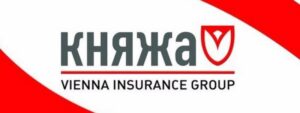
In 2024, the insurance company Knyazha Vienne Insurance Group (Knyazha VIG, Kyiv) collected UAH 2.517 billion in insurance premiums, which is 26.36% more than in 2023.
This follows from the announcement of the rating agency Standard-Rating on the affirmation of the financial strength rating/credit rating of the insurer at uaAA+ for the period under review.
According to RA’s website, during the period under review, revenues from individuals increased by 25.89% to UAH 1.797 billion, and from reinsurers – by 55.04% to UAH 6.155 million. The share of individuals in the company’s gross written premiums amounted to 71.39%, and the share of reinsurers – 0.24%.
Insurance payments sent to reinsurers in 2024 increased by 30.29% compared to 2023 – up to UAH 314.465 million. Thus, the ratio of reinsurers’ participation in insurance premiums increased by 0.37 p.p. to 12.49%.
At the same time, RA notes that net written premiums increased by 25.80% to UAH 2.203 billion, and net earned premiums increased by 36.67% to UAH 2 billion.
The volume of insurance payments and reimbursements made by Knyazha VIG in 2024 increased by 58.53% compared to 2023, to UAH 1.005 billion. Thus, the level of payments increased by 8.11 percentage points to 39.94%.
In 2024, despite the loss-making result from operating activities, the insurer received a net profit of UAH 0.142 million.
Assets as of December 31, 2024 increased by 22.28% to UAH 2.180 billion, equity increased by 0.25% to UAH 449.832 million, liabilities showed an increase of 29.69% to UAH 1.730 billion, cash and cash equivalents increased by 62.93% to UAH 81.539 million.
RA notes that during the reporting period, the insurer made financial investments in the amount of UAH 1.014 billion, which consisted of government bonds (74.69% of the investment portfolio), as well as deposits in banks with a high credit rating (25.31% of the portfolio). Thus, liquid assets covered 58.64% of the insurer’s liabilities.
PrJSC “IC ‘Knyazha Vienna Insurance Group’ is a part of IFG Vienna Insurance Group Ukraine, the main shareholder of which is Vienna Insurance Group AG Wiener Versicherung Gruppe (Austria). The group also includes PrJSC IC Ukrainian Insurance Group – 100%, PrJSC IC KnyazhaLife Viena Insurance Group – 97.8%, LLC USG Consulting – 50.7%, LLC VIG Services Ukraine – 78.7%, LLC Assistance Company Ukrainian Assistance Service – 100%.

China’s Ping An Insurance is the most expensive brand among the world’s insurance companies for the ninth consecutive year, according to an annual study by consultancy Brand Finance.
Its value remained virtually unchanged over the year ($33.6 billion), while the brand value of German insurer Allianz increased by 9% (to $26.75 billion), allowing it to slightly close the gap.
Third place goes to France’s AXA ($19.83 billion, up 20%), which pushed China Life Insurance ($18.32 billion, up 5%) into fourth place. Rounding out the top five is Italy’s Generali ($16.98 billion, up 47%).
There are four U.S. brands in the top 10: Allstate Corp – $15.95 billion, GEICO – $15 billion, MetLife Inc. – $14.59 billion and Progressive Corp. – $14.24 billion. Between them, China’s PICC ($15 billion) ranks eighth.
The fastest growing brand was Japan’s Nissay/Nippon Life Insurance, whose value almost doubled (+94%) and reached $9.2 bln. This was due to the company’s expansion outside the local market, including through the purchase of a 20% stake in the U.S. company Corebridge Financial.
The total value of the top 100 insurance brands for 2024 grew 9%, according to the report. Meanwhile, U.S. brands rose in value by 12%, with the result that they now account for a quarter of the total value.

International financial service NovaPay (TM NovaPay) plans to publicly place 10 series – J – bonds issued by its subsidiary NovaPay Credit LLC with a total nominal amount of UAH 100 million, which will bring the company’s bonds in circulation to UAH 990 million.
As the issuer reported in the National Securities and Stock Market Commission’s (NSSMC) disclosure system, the relevant decision was made by the general meeting of the company’s shareholders on March 5.
The face value of the bonds is UAH 1 thousand, and there is no information on other terms of the J series.
“The funds raised as a result of the bond issue through a public offering are planned to be used in the following areas: credit operations for legal entities – 20% of the actual funds raised; credit operations for individuals – 80% of the actual funds raised,” the announcement traditionally states.
As reported, in 2023, NovaPay made three public issues of interest-bearing bonds of series A, B, and C for UAH 100 million each, and last year issued six more series of bonds – D, E, F, G, H, and I. In particular, in October-December 2024, three series of bonds – G, H and I – were placed for a total amount of UAH 290 million, which increased the total amount of the company’s securities in circulation to UAH 890 million. G and H series securities of UAH 100 million each are available for purchase via the NovaPay mobile application, while I series bonds of UAH 90 million are offered for sale to institutional clients.
On Thursday, the company reported that about 4.3 thousand Ukrainians have purchased NovaPay bonds totaling about UAH 1.2 billion, while at the beginning of the year it reported more than 3 thousand customers and UAH 740 million, and in mid-October 2024 – 2.6 thousand customers and UAH 600 million.
According to the prospectuses, the bonds of the last three series were issued for three years. The nominal interest rate on these bonds is 17% per annum, while for the previous three series it was 18%. The interest income on the G and H series bonds is scheduled to be paid at the end of the maturity period, while the I series bonds are to be paid quarterly, and the interest rate is currently set for the first year of circulation.
NovaPay, which promotes most of its bonds as an alternative to bank deposits through a one- to 12-month repurchase scheme, declares interest rates of up to 18% per annum.
According to the Standard Rating agency, the value of NovaPay Credit’s loan portfolio in the first nine months of 2024 increased by 53.4% to UAH 639.11 million, the number of loan agreements doubled to 90.41 thousand, the share of loans overdue for more than 90 days increased from 0.86% to 3.57%, and the effective interest rate on the loan portfolio increased from 44.69% to 58.55%.
The company’s revenue from sales in January-September 2024 increased by 2.9 times to UAH 170 million, net profit – by 84.9% to UAH 55.3 million, and equity – by 20.9% to UAH 319.1 million.
NovaPay is an international financial service founded in 2001. It is part of the Nova group and provides financial services online and offline at Nova Poshta offices. According to its website, the company employs about 13,000 people in more than 3,500 Nova Poshta offices across Ukraine.
According to the National Bank of Ukraine, the company accounts for about 35% of the total volume of domestic money transfers.

Ukrainian car fleet in February this year was replenished with almost 17 thousand imported from abroad used cars, which is 5% less than in February last year, reported “UkrAvtoprom” in the Telegram channel.
At the same time, compared to January-2025, the demand for such cars increased by more than 21%.
According to the report, the average age of used cars that switched to Ukrainian registration in February amounted to 9.5 years.
According to “UkrAvtoprom”, the largest share in the segment of imported second hand cars with a large gap belongs to gasoline cars – 46%. Next come diesel cars – 23%, electric cars – 22%, hybrids – 5% and cars with SBB – 4%.
The leader of this segment of the car market is Volkswagen Golf – 900 registrations.
The top five most popular models are also Renault Megane – 653 units, Skoda Octavia – 592 units, Volkswagen Tiguan – 490 units, Audi Q5 – 449 units.
In total, in January-February, the first registration in Ukraine passed almost 31 thousand used cars, which is 10% less than in the same period in 2024.
As reported, in 2024 the demand for used foreign cars increased by 4% by 2023 – up to 222.1 thousand units, which amounted to 75% of the passenger car market.
At the same time, in February the Ukrainian car fleet was replenished with 17.8 thousand used cars from abroad – one third more than in February-2023.

In July-January of 2024-2025 marketing year (MY), Ukraine exported 40.4 thsd tonnes of wheat flour, down 36.1% year-on-year, reports the Association of Millers, citing the State Customs Service.
According to the infographics published in Facebook, the export volumes in the season-24/25 are slightly lower than in the previous seasons – for 7 months of 2023/24 MY Ukraine exported 63.2 thsd tonnes of wheat flour, and in 2022/23 MY – 79.8 thsd tonnes.
At the same time, about 17.0 thsd tonnes were exported to the EU countries, almost 12.4 thsd tonnes – to Moldova, 8.1 thsd tonnes – to Palestine, 1.5 thsd tonnes – to Israel.

Sales of new passenger cars in February this year decreased by 20% compared to the same month of 2023 – to 4.8 thousand units, AUTO-Consulting reports.
According to the report on the group’s website, the biggest drop occurred in the segment of so-called “budget cars” – by almost 54%, also the sales of cars of medium price range decreased by 20%.
In February, the leadership was held by Toyota, but the second place was taken by Skoda with 8.4% of the market. Finishing third in February was Renault.
”Interestingly, four of the top 10 automobile brands in February showed growth, but in the end the market still lost 20%,” the report states.
AUTO-Consulting emphasizes that the decline in the electric car segment was more widespread than the overall decline in the market for new passenger cars – demand for them decreased by 37%, and their share amounted to only 15.6% against 20% in February-2024.
According to analysts, compared to January this year, sales of new passenger cars increased (by 5.3%), but at the end of January-February decreased by 13.6% compared to the two months of 2024.
“So, we have a negative result in the auto market for two months so far. This has already brought about changes among the top 20 automobile brands as well. The car market is still moving along the trend of 2017,” the report said.
As reported, according to AUTO-Consulting, in 2024, sales of new passenger cars in Ukraine increased by 9.8% to 2023 – up to 71.3 thousand units.